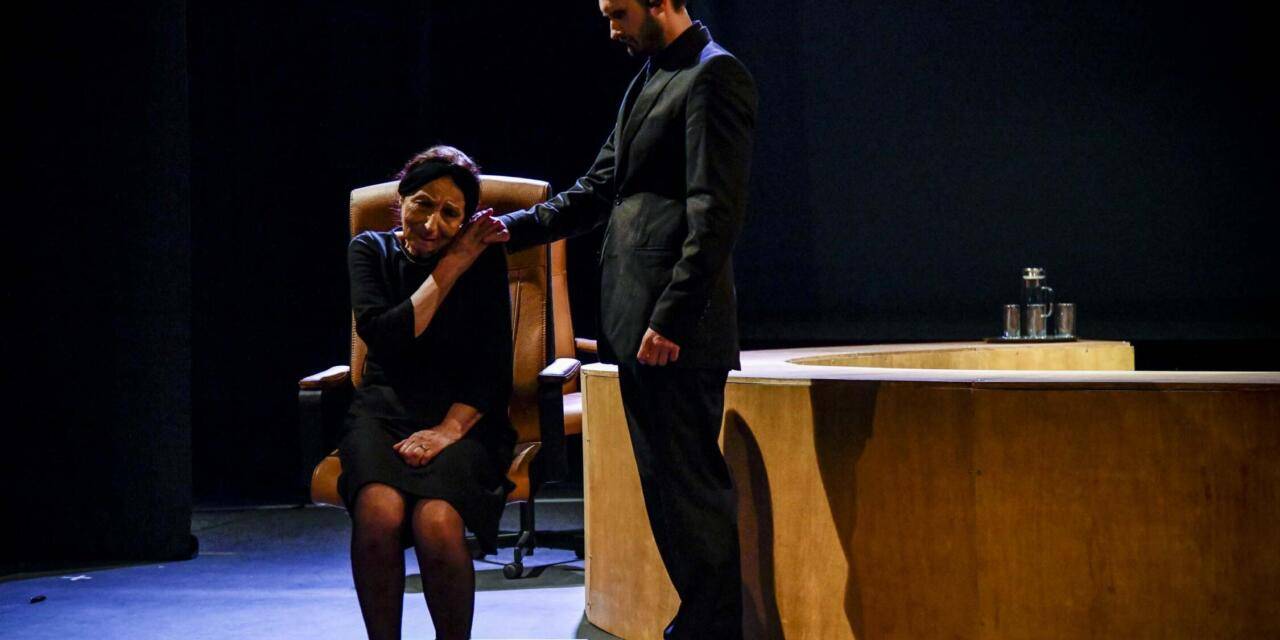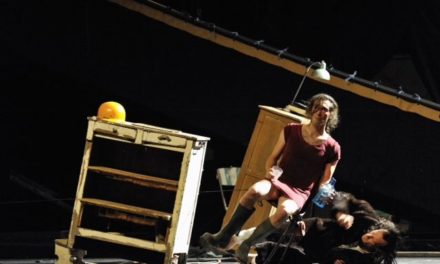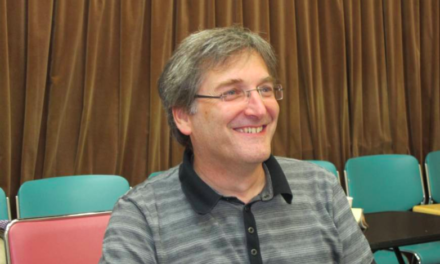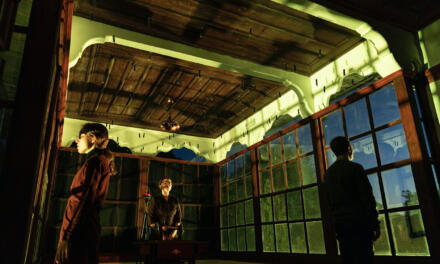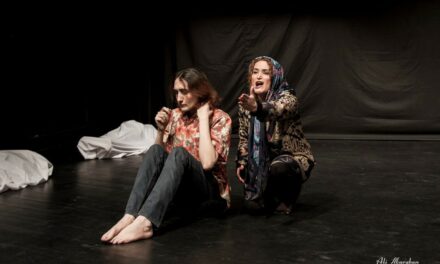Orest Pastukh is a theatre and film actor, director, playwright and educator. He was born in the Galicia region (Western region) of Ukraine and graduated from the Institute of Art at the Carpathian National University. He has worked at several prominent Ukrainian theatre institutions and has been an actor at The Kyiv academic Golden Gate Theatre since 2018. He is also a published short story writer, poet and essayist. Since 2022 he has been part of the “Imagine UA” project which aims to populise and support Ukrainian Theatre in the City Theatres in Prague. He is also part of the ensemble working on Negotiating Peace, Kosovo playwright Jeton Neziraj’s new play, directed by his partner/collaborator Blerta Neziraj. The play was part of the Kosovo Theatre Showcase in Pristina in October this year and is currently touring Europe. Negotiating Peace, which features an international cast, aims to interrogate the processes behind peace discussions and is inspired by the Northern Ireland talks, the Oslo Agreement, ongoing talks between Kosovo and Serbia, as well as the Dayton Accords.
verity healey: Orest, could you give an overview of theatre in Ukraine before Russia’s war on it? Has it changed at all?
Orest Pastukh: I am not ready to say that Ukrainian theater has changed fundamentally after the full-scale invasion. Rather, certain strategies have changed. For example, Ukrainian theater abroad has taken on a representative and informational function and in the form of projects and collaborations, works in a range of topics from “Who we are” – opening us to the world as a nation and country – to “What happened to us on 24.02.2022.” This is directly about Russian aggression and its causes. This helps to destroy stereotypes and distortions of both Ukrainian history and the world’s perception of Ukraine and Ukrainians. And it is important, both from the point of view of supporting Ukraine during the times of armed aggression, as well as in the context of European history, because for too long Ukrainians have remained in the shadow of Russian imperial colonialism and its culture. For too long we have been deprived of cultural subjectivity, so now is the time to reclaim our place in European space and time.
At home, Ukrainian theater is trying to continue to be a moral support for its own audiences. Since the invasions it has undertaken different roles – to be a shelter for refugees, a bomb shelter, a place of strength, weakness, sadness and joy, until it returned to its main activity. Theatre is still about social issues, about politics, about the war that has been going on since 2014, refugees, history, self-identification, but it is also a place where people can come and laugh at themselves and forget the war. Modern readings of the classics or modern European drama is also still popular. Ukrainian audiences find that living in war is too painful, so they want something more hopeful. Theatre is now programming more normal repertoire. I think the war theme will be with us for decades, so I think that there will be work which analyses what happened, rather than just recording it in the form of storytelling.
The main changes for the Ukrainian theater are still ahead. It needs many institutional and legislative improvements. Dialogues with Western partners will take place in the form of collaborations , which will have a positive impact on its further development. In the past, Ukrainian theatre has been too closed. It knew too little about the world, just as the world knew too little about it. The main takeaway though is that despite the conditions of war, despite constant sirens, shelling, problems with electricity and other difficulties, theatres quickly opened their doors to audiences. And audiences came, which showed that they needed each other. I consider this the most valuable discovery during this war.
verity healey: Has your idea of what theatre is for and can do changed at all since the awful events then?
Orest Pastukh: I have always perceived the theater as a space for frank conversation without lies. A place where politics and information manipulation have no influence. A place of freedom, and therefore, of strength. A place where we can dissect reality and draw conclusions from it. Under the influence of Russian aggression, this perception has not changed, rather the perception of art in general has changed, because after all the atrocities of the Russian army, and in general, after all the recent events in the world that we see now in the news, more and more often I understand that art cannot influence anything, cannot prevent anything. It can speak, scream, but, unfortunately, never save anything. And since theater is a part of art, then… it, like art, in my opinion, is still assigned the same bitter role – that of Cassandra. The role is important, but unfortunately, too powerless…
verity healey: When Russia first invaded Ukraine what were your initial feelings about being an artist and civic and artistic responsibility?
Orest Pastukh: When the large-scale invasion happened on February 24, 2022, I was in shock, although as a country we had been living with the possibility of this attack for months…But, war is like death, you may know it is coming, but you will never be ready for it. I remember that after the first explosions, I wrote on Facebook: “Lord, help us resist this Goliath.” To begin with, it didn’t matter what your profession was, everyone was as useful as possible for the country.. And what is the value of being an artist when tomorrow your country may no longer exist?
Later some resumed their work in theatre at home, some went to the front, some volunteered, and some to implement projects abroad. But even if your project is successful, it doesn’t cost the health and possible life of someone who went to the front, or a comrade who is still considered missing. Yes, we, as people, like to hide behind phrases about the “cultural front” and “artistic responsibility”, but in fact, those of us who have the strength to be frank with ourselves realize that in fact we should all be there, in the trenches, at the front, and under fire… And these are the thoughts that will always be with you… like your own shadow… And this is something we will often be silent about…
So yes, it is really difficult to decide what to do, as well as to accept the fact that there will never be a right choice without sacrifices and difficult compromises…
Verity Healey: How do you see artists and theatremakers’ role post conflict and during a possible peace agreement?
Orest Pastukh: Ukrainian theatre has always been about identity and there have always been Ukrainian classics in Ukrainian, so I don’t think this will change after the war. I think that in the future, there will be more texts about the trauma of war. After 2014, Ukrainian theater had already begun to work on the topic of post-colonial trauma, which is important for Ukrainians. I think this work will continue, but with a slightly different view of things. I think more people overseas will discover Ukrainian theatre which will make it more visible.
Artists and theatres have only one role – to be a counterargument to populism and political manipulation. Of course, politics with its dirty methods has not changed or gone away so we must not allow it to manipulate society. Theatre should resist and work within society, to explain any controversial social processes or politics. I think this is especially important regarding the possibility of signing peace agreements, since such a possibility will definitely cause a rather ambiguous reaction in society.Theatre must understand the level of trauma post-war and help society work through it. This applies to those who stayed at home. As for those who are now working in Europe, our main enemy is, of course, Russian propaganda and false news. Our task is to conduct a dialogue at all levels, to speak to as many people as possible. Creatives have to be more than just performers of roles, more than actors just taking a bow. I think that these are the main roles of actors anyway, in the world in general in the 21st century, and not just in times of war. We live in a time in which good old values and ideals are being devalued, and they are replaced, if not by double standards, then by post truth or something similar. I am not just thinking about Ukraine now, because I think this is not the last cataclysm that awaits Europe and the world in the next century.
Verity Healey: I know that a colleague in Prague suggested you get involved with Negotiating Peace, but the show’s themes must be hard for you.
Orest Pastukh: The offer to take part in the “Negotiating Peace” project was interesting as for me, as well as for Ukrainian society, any conversation now about a dialogue with the Russians is quite traumatic. Although, putting emotions aside, I realize that the moment of signing such an agreement is inevitable, as well as the end of the war. I think the whole difficulty is that we don’t know the conditions, so we try not to think about it yet. The play allows you to look at this process from a different angle, and deprives you of many illusions. It brings before us the main characters of the era – politicians – morally weak, cynical, degraded – and shows everything that happens behind closed doors as a farce. Looking at this, it becomes clear why we did not end the concept of war after the two world wars, and probably will not end it. But there are people who really believe in the power of negotiating peace, such as my character Aleko. This is an ordinary local guy from a country where the guns have just stopped, and he is happy that he has something to do with the peace process, he believes in all these great people in expensive suits, in democracy and its supremacy of higher justice…but then he has to go through something unpleasant, as happens to most of us who have suffered war.
I think this is a useful performance, because it asks a lot of important questions, and gives a sense of what is wrong with our world and what will happen to it tomorrow. For me, the main positive thing about working on this project was that I no longer have any illusions. In any peace agreement, I understand that there will be both pros and cons. It will never restore our shattered past lives, nor will it ever bring us back our lost friends and relatives. Although some will make a career out of this process. That’s what life is like. And this is also what our play says.
Verity Healey: Does theatre have to touch everyone in some way or be universal? Is it up to those who struggle with a show to find something in it, even if that thing they find is resistance in themselves?
Orest Pastukh: It seems to me that nothing harms theatre so much as any universality imposed on it, as well as any framework that should somehow regulate or control it. This, in my opinion, is against its essence and against the very essence of the act of art. Europeans may not fully understand this, but for several long decades Ukraine had to exist in the paradigm of the Stalinist cultural philosophy of socialist realism. This was actually an example of the unification of art. You can imagine the result – in different parts of the “great empire” there were performances of exactly the same type and quality. This, in my opinion, is more about limitation than about the freedom of creativity. Theater, like any art, is nothing more than a subjective reaction to reality, which finds its expression in images. It’s the same as a conversation between people. But it is enough to listen to the interlocutor, in order to understand him or her. It is not obligatory to have the same experience as them to comprehend. From the time of its inception, the theater gave the audience a choice – if not in genres, then in plots. Why should modern theater should go against its own nature?… One of the biggest mistakes an audience can make is to think that the theater owes you something. No. It can be liked, it can be misunderstood, it can be repulsive. It may go too deep into the territory of trauma, it may be too superficial or detached from reality. But the main thing is that it should be sincere and interesting. Then it will be art. Just as today we cannot talk about any restrictions on its role for society. In each country, it is different depending on the needs of society. But as we can see, throughout history, in one era or another, it sometimes takes on a greater role than just entertainment, albeit even intellectual. And if earlier we were shocked by the catharsis from the finale of an ancient Greek tragedy, today I can feel the same catharsis from the fact that in the theater they talked about my pain, which I have never told anyone about. And I suddenly realized how to live with it..More and more often I understand that the theater is now an interlocutor. And yes, I may not always agree with them, but it will always be interesting to me precisely because of the fact of this conversation…
Verity Healey: What shows are you going to be doing in the future, are there any projects you would like to briefly describe and your hopes for them?
Orest Pastukh: I don’t have a clear idea of any areas of work in the future. I work in a freer manner. It’s easier for me. The main thing is the material, then to be lucky with the place and the team. When all these components come together, it can be good.. This is my hope. Of course what I make theatre about will be different, because we live in a rather dynamic era, where yesterday’s truths sometimes age faster than your freshly bought coffee gets cold…
This post was written by the author in their personal capacity.The opinions expressed in this article are the author’s own and do not reflect the view of The Theatre Times, their staff or collaborators.
This post was written by Verity Healey.
The views expressed here belong to the author and do not necessarily reflect our views and opinions.

